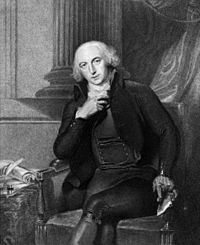Sylvester Douglas, 1st Baron Glenbervie facts for kids
Quick facts for kids
The Lord Glenbervie
|
|
|---|---|
 |
|
| Chief Secretary for Ireland | |
| In office 1793–1794 |
|
| Monarch | George III |
| Prime Minister | William Pitt the Younger |
| Preceded by | Lord Hobart |
| Succeeded by | Viscount Milton |
| Personal details | |
| Born | 24 May 1743 |
| Died | 2 May 1823 (aged 79) |
| Nationality | British |
| Spouse | |
| Alma mater | |
Sylvester Douglas, 1st Baron Glenbervie (born May 24, 1743 – died May 2, 1823) was an important British figure. He was a skilled lawyer, a busy politician, and he kept detailed diaries. He served as the Chief Secretary for Ireland from 1793 to 1794. This role was like being a top government assistant in Ireland. He was also a member of the Privy Council, a group of trusted advisors to the King.
Contents
Early Life and Education
Sylvester Douglas was born into the Douglas family. His father was John Douglas, and his mother was Margaret Gordon. His sister, Katherine, later married a poet and army officer named James Mercer.
Sylvester went to the University of Aberdeen and earned his master's degree in 1765. After that, he studied both law and medicine at the University of Leyden in the Netherlands. He then moved to London to continue his law studies.
Becoming a Lawyer
In 1771, Sylvester joined Lincoln's Inn, a famous place where lawyers are trained. He officially became a lawyer in 1776. By 1793, he was made a King's Counsel, which is a special title for experienced lawyers who advise the Crown.
Political Career
In 1793, Sylvester Douglas stopped working as a lawyer. He was appointed Chief Secretary for Ireland by the Prime Minister, William Pitt the Younger. This was a very important job in the Irish government.
Serving in Parliament
In 1794, he became a member of both the Irish and English Privy Councils. This meant he was a close advisor to the King in both countries. He was also elected to the Irish House of Commons for a place called St Canice. He held this seat until 1796.
Later, he became a member of the British House of Commons. He represented different areas, including Fowey, Midhurst, Plympton Erle, and Hastings, from 1795 to 1806.
Declining a Governorship
In 1796, Sylvester was asked to go to the Cape of Good Hope (in modern-day South Africa). He was meant to take over as governor after Earl Macartney. He was even offered a special title, called an Irish peerage, if he accepted. However, his wife did not want to move, so he said no.
He was asked again in 1800 to be the Governor of the Cape. He finally agreed, again with the promise of an Irish peerage. But he changed his mind once more! Instead, he accepted a different job in London as a Joint Paymaster of HM Forces. He even received a salary from the Cape Treasury, even though he never went there.
Becoming a Baron
At the end of 1800, on November 29, he was given the title Baron Glenbervie. This made him a peer, a member of the nobility, from Kincardine in Scotland.
Other Government Roles
Lord Glenbervie held several other important government positions:
- He was a Joint Paymaster of the Forces from 1801 to 1803. This job involved managing money for the army.
- He served as Vice-President of the Board of Trade from 1801 to 1804. This role dealt with trade and business.
- From 1803 to 1806, and again from 1807 to 1810, he was the Surveyor General of Woods, Forests, Parks, and Chases. This meant he was in charge of royal forests and parks.
- In 1810, his job changed slightly, and he became the First Commissioner of Woods and Forests. He held this position until 1814.
Family Life
In 1789, Lord Glenbervie married Lady Catherine Anne. She was the eldest daughter of Frederick North, Lord North. They had one son named Frederick Douglas. Their son became a Member of Parliament for Banbury, but sadly, he died young in 1819.
Lady Glenbervie passed away in February 1817 when she was 56 years old. Lord Glenbervie lived for six more years and died in May 1823, at the age of 79. Because he had no other sons who survived him, his title of Baron Glenbervie ended when he died.
Academic Recognition
Lord Glenbervie was also recognized for his contributions to knowledge. In 1795, he was elected a Fellow of the Royal Society of London. This is a very old and respected group of scientists. In 1806, he became a Fellow of the Royal Society of Edinburgh, another important academic society.
 | John T. Biggers |
 | Thomas Blackshear |
 | Mark Bradford |
 | Beverly Buchanan |

